D.C. Blogger Inspects H and 8th
Disclaimer: Lonnie’s views are not necessarily those of the residents in and around the 700 block of 8th Street NE, who simply want the amplifier turned off.
Documenting a community’s quest for the right to peace and quiet near H Street Northeast in Washington, D.C.
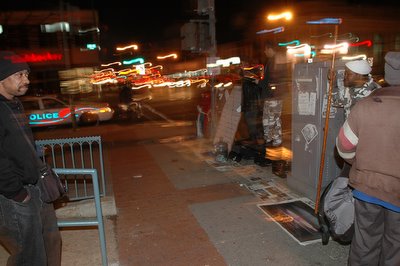 (CLICK TO ENLARGE) The D.C. law renders police powerless to do anything about the blaring amplifier pointed at the houses. Traffic noise hums as amplified speech blares from the corner of H and 8th Streets NE on Jan. 28. (Copyright © 2006. David Klavitter)
(CLICK TO ENLARGE) The D.C. law renders police powerless to do anything about the blaring amplifier pointed at the houses. Traffic noise hums as amplified speech blares from the corner of H and 8th Streets NE on Jan. 28. (Copyright © 2006. David Klavitter)
What physical qualities of noise affect a person's subjective response?
The physical attributes of noise that can affect an individual's subjective response include: apparent loudness or intensity, spectral shape, presence of discrete frequency components, abruptness or impulsiveness, intermittency, duration, and temporal variations.
Besides the physical attributes of the noise itself, what other aspects of the exposure situation affect the individual's response?
Among the factors that affect an individual's response to noise are contextual factors such as: the time of day, the activity interfered with, the ability to control the source, and the information content of the noise. Response may also be affected by personal factors such as previous experience with noise exposure or socio-economic and educational status.
To what degree does noise cause neighborhood dissatisfaction?
The HUD Annual Housing Survey (1975, 1976) indicates that noise is the most frequently cited undesirable neighborhood condition, surprisingly ranking higher than crime. Noise is often given as the reason for residents wanting to move from their neighborhoods.
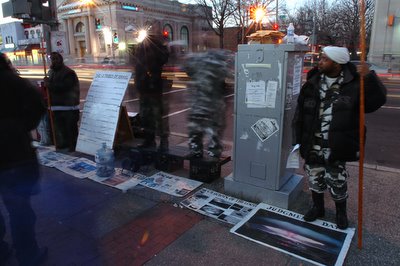 (CLICK TO ENLARGE) From day to night. Traffic noise hums as amplified speech drones on into a pleasant Jan. 28 evening at the corner of H and 8th Streets NE. (Copyright © 2006. David Klavitter)
(CLICK TO ENLARGE) From day to night. Traffic noise hums as amplified speech drones on into a pleasant Jan. 28 evening at the corner of H and 8th Streets NE. (Copyright © 2006. David Klavitter)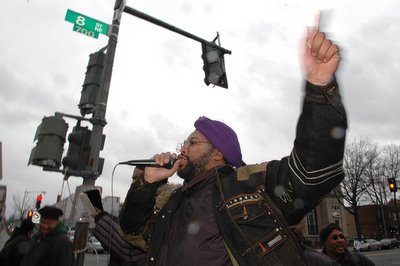 (CLICK TO ENLARGE) Amid sprinkles of a chilly rain, the one who calls himself Yohanna yells into the microphone at the corner H and 8th Streets NE on Jan. 14, 2006. His voice is strong and loud—even without the amplifier. (Copyright © 2006. David Klavitter)
(CLICK TO ENLARGE) Amid sprinkles of a chilly rain, the one who calls himself Yohanna yells into the microphone at the corner H and 8th Streets NE on Jan. 14, 2006. His voice is strong and loud—even without the amplifier. (Copyright © 2006. David Klavitter)The preferred position of freedom of speech in a society that cherishes liberty for all does not require legislators to be insensible to claims by citizens to comfort and convenience. To enforce freedom of speech in disregard of the rights of others would be harsh and arbitrary in itself.
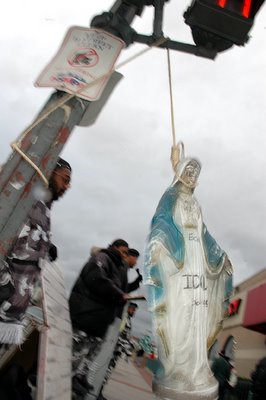 (CLICK TO ENLARGE) The neighborhood’s efforts have focused on reducing the amplified noise broadcast for hours nearly every Saturday from the corner of H and 8th Streets NE. The residents have defended the rights of free speech and assembly for one group. But a blurb in the Washington Post about a hate crime investigation causes me to ponder the difference between sound waves and wood crossing into one’s yard. (Copyright © 2006. David Klavitter)
(CLICK TO ENLARGE) The neighborhood’s efforts have focused on reducing the amplified noise broadcast for hours nearly every Saturday from the corner of H and 8th Streets NE. The residents have defended the rights of free speech and assembly for one group. But a blurb in the Washington Post about a hate crime investigation causes me to ponder the difference between sound waves and wood crossing into one’s yard. (Copyright © 2006. David Klavitter)
Hate crime is the violence of intolerance and bigotry, intended to hurt and intimidate someone because of their race, ethnicity, national origin, religious, sexual orientation, or disability. The purveyors of hate use explosives, arson, weapons, vandalism, physical violence, and verbal threats of violence to instill fear in their victims, leaving them vulnerable to more attacks and feeling alienated, helpless, suspicious and fearful. Others may become frustrated and angry if they believe the local government and other groups in the community will not protect them. When perpetrators of hate are not prosecuted as criminals and their acts not publicly condemned, their crimes can weaken even those communities with the healthiest race relations.
Of all crimes, hate crimes are most likely to create or exacerbate tensions, which can trigger larger community-wide racial conflict, civil disturbances, and even riots. Hate crimes put cities and towns at-risk of serious social and economic consequences. The immediate costs of racial conflicts and civil disturbances are police, fire, and medical personnel overtime, injury or death, business and residential property loss, and damage to vehicles and equipment. Long-term recovery is hindered by a decline in property values, which results in lower tax revenues, scarcity of funds for rebuilding, and increased insurance rates. Businesses and residents abandon these neighborhoods, leaving empty buildings to attract crime, and the quality of schools decline due to the loss of tax revenue. A municipality may have no choice but to cut services or raise taxes or leave the area in its post-riot condition until market forces of supply and demand rebuild the area.
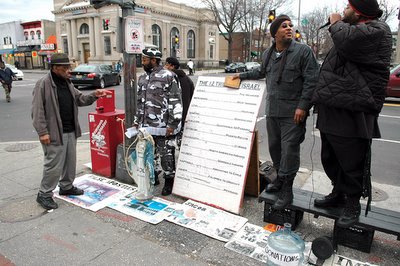 (CLICK TO ENLARGE) A man (left) confronts the amplified preachers today, asking why they didn’t do more to improve the community instead of what he called “spreading lies.” The man asked if the preachers knew the names of their grandmothers, in which the preachers answered via amplifier that their grandmother is named in the bible. At this, the man grew extremely irate, at times removing his hat and screaming. He continued to ask each noisemaker if he knew the name of his grandmother. They screamed back at him, the amplified speech drowning out his unaided voice. The man eventually stomped off, walking east on H Street. (Copyright © 2006. David Klavitter)
(CLICK TO ENLARGE) A man (left) confronts the amplified preachers today, asking why they didn’t do more to improve the community instead of what he called “spreading lies.” The man asked if the preachers knew the names of their grandmothers, in which the preachers answered via amplifier that their grandmother is named in the bible. At this, the man grew extremely irate, at times removing his hat and screaming. He continued to ask each noisemaker if he knew the name of his grandmother. They screamed back at him, the amplified speech drowning out his unaided voice. The man eventually stomped off, walking east on H Street. (Copyright © 2006. David Klavitter)
(average 4 hours per Saturday) x (average 50 Saturdays per year) = 200 hours of amplified noise blasting the neighborhood each year
Today’s “Roll Call” story is in addition to the Jan. 12 ”Voice of the Hill article and editorial in support of a fix to the D.C. law.
Their effort [in reducing amplified noise] centers on a group of people who, armed with microphones and amplifiers, regularly spend their Saturday afternoons on the corner of H and Eighth streets Northeast, preaching their views of the world to passersby.
It gets really loud. In fact, Klavitter said he and his neighbors are able to hear the speeches in their homes, even with the windows closed.
Repeated attempts to convince the group to turn off the amplifier, or at least lower the volume, have failed. And police can’t force the group to quiet down because Washington, D.C., law allows for amplified non-commercial speech from 7 a.m. to 9 p.m.
So Klavitter rallied his neighbors. He started a Web log, http://questforquiet.blogspot.com, in an effort to raise awareness and put pressure on the City Council to change the law. And he has been in contact with various District agencies to reach a solution.
It is not the First Amendment that Klavitter and his allies want to quell. It’s just the noise. ”I do believe in the freedom of speech. However, I do not believe we must endure on (or inside) our own property someone’s loud ranting for three or four hours every Saturday afternoon,” Klavitter posted on his first blog entry.
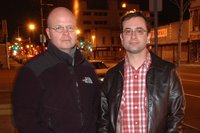
DATE: Jan. 11, 2006
TO: Advisory Neighborhood Commission 6C
FROM: David Klavitter
Resident, 700 block of 8th Street NE
RE: ANC6C support for fixing D.C. statute allowing amplifiers
I ask the commission to officially support amending the “Georgetown Project and Noise Control Amendment Act of 2004” in order to modify an exception currently contained in the noise ordnance that permits amplified free speech on our public streets.
ANC6A Commissioner Joe Fengler, whose district is the source of the noise, sent a Dec. 15, 2005 letter to Ward 6 Councilmember Sharon Ambrose and Councilmember Jim Graham, chair of the Committee on Consumer and Regulatory Affairs. Commissioner Fengler’s letter requested an amendment to the D.C. law (SEE ATTACHED). The noise immediately impacts residents living in the districts represented by ANC6C Commissioners Michael Sherman and Anthony Rivera, and therefore warrants action by the commission.
Currently, members of the Israelite Church of God and Jesus Christ, Inc. gather on Saturdays at the corner of Eighth and H Streets, NE to exercise their right of free speech. This group often uses an amplifier to deliver their religious message. The use of the amplifier projects the sound to the surrounding streets in all directions disturbing the peace, order and quiet of our neighborhood. We have no objection to the group or their religious speech. Our objection is the use of the powered amplifier. Over the last nine months, the neighbors have worked with ANC6A and ANC6C, Metropolitan Police Department, Department of Consumer and Regulatory Affairs and the Office of the Attorney General to try to resolve this issue. I testified about this on Nov. 2 before Councilmember Graham’s committee.
In December 2005, the D.C. Office of Attorney General found that amplified, non-commercial free speech on any residential street was permitted in the District from 7 a.m. to 9 p.m. (SEE ATTACHED).
Commissioner Fengler proposes an amendment to the “Georgetown Project and Noise Control Amendment Act of 2004” to prohibit the use of amplifiers. I agree there may be a more technically sound amendment that better captures the intent of the proposed change. I also strongly encourage that in the consideration of the change, the Office of the Attorney General is included in the drafting process to ensure the outcome provides an enforceable ordinance.
Finally, I ask the city council and attorney general to examine the 1949 U.S. Supreme Court decision KOVACS v. COOPER, which found a municipal ban on the use of any sound system emitting "loud and raucous" noises on public streets did NOT violate the First and Fourteenth Amendments.
 (CLICK TO ENLARGE) A statue of the Virgin Mary twists in the wind as it hangs from a traffic light on the southeast corner of H and 8th Streets NE on Jan. 14. Despite winds gusting to 35 mph and temperatures in the upper 30s, the noisemakers employed the powered amplifier during the hours-long ranting. Nobody was injured by this swinging Mary statue during my nearly two hours at the corner. (Copyright © 2006. David Klavitter)
(CLICK TO ENLARGE) A statue of the Virgin Mary twists in the wind as it hangs from a traffic light on the southeast corner of H and 8th Streets NE on Jan. 14. Despite winds gusting to 35 mph and temperatures in the upper 30s, the noisemakers employed the powered amplifier during the hours-long ranting. Nobody was injured by this swinging Mary statue during my nearly two hours at the corner. (Copyright © 2006. David Klavitter)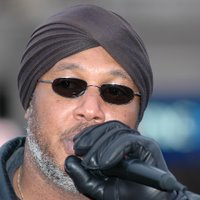 Sunglasses Man, photographed on Jan. 7, blocked my access to the public space behind the stage, calling it their “camp.” (Copyright © 2006. David Klavitter)
Sunglasses Man, photographed on Jan. 7, blocked my access to the public space behind the stage, calling it their “camp.” (Copyright © 2006. David Klavitter)“It’s like you’re being tortured, honestly,” said Jane Wilkomm, who lives in the 700 block of Eighth Street, NE, and says she can hear the group’s message inside her home. “If this were in front of [Ward 6 Councilwoman] Sharon Ambrose’s house, that law would be struck tomorrow.”A photo from “Quest for Quiet” and a link to this “Quest for Quiet” blog accompanies the story.
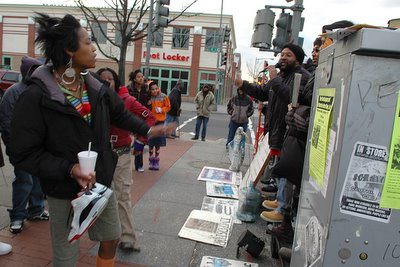 (CLICK TO ENLARGE) This Jan. 7, 2006 photo shows one of the preachers and a woman passerby shouting at each other. She said he was “going to hell” and was touting her church, while he was calling her minister a "slick nigger." She, however, was shouted down because the preacher had the advantage of using the amplifier. I never saw him offer her the microphone. When someone yells into the microphone, the amplifier becomes very loud and the entire corner is boisterous with people yelling and screaming. Quite a noisy--and interesting--scene indeed. (Copyright © 2006. David Klavitter)
(CLICK TO ENLARGE) This Jan. 7, 2006 photo shows one of the preachers and a woman passerby shouting at each other. She said he was “going to hell” and was touting her church, while he was calling her minister a "slick nigger." She, however, was shouted down because the preacher had the advantage of using the amplifier. I never saw him offer her the microphone. When someone yells into the microphone, the amplifier becomes very loud and the entire corner is boisterous with people yelling and screaming. Quite a noisy--and interesting--scene indeed. (Copyright © 2006. David Klavitter)“I join the judgment sustaining the Trenton ordinance because I believe that operation of mechanical sound-amplifying devices conflicts with quiet enjoyment of home and park and with safe and legitimate use of street and market place, and that it is constitutionally subject to regulation or prohibition by the state or municipal authority. No violation of the Due Process Clause of the Fourteenth Amendment by reason of infringement of free speech arises unless such regulation or prohibition undertakes to censor the contents of the broadcasting. Freedom of speech for Kovacs does not, in my view, include freedom to use sound amplifiers to drown out the natural speech of others.”Have no fear of treading on first amendment rights, my dear D.C. City Council. There is a supreme precedent.
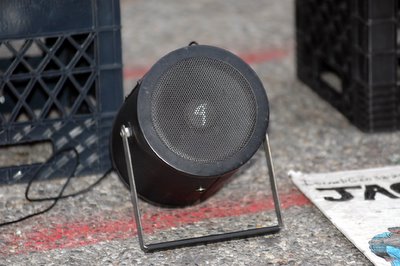 (CLICK FOR A LARGER VIEW) The noisemakers’ amplifier of choice at H and 8th Streets NE: The Fender “Amp Can.” (Copyright © 2006. David Klavitter)
(CLICK FOR A LARGER VIEW) The noisemakers’ amplifier of choice at H and 8th Streets NE: The Fender “Amp Can.” (Copyright © 2006. David Klavitter) (CLICK FOR A LARGER VIEW) The neighbors—and passersby—can attest that Fender’s “Amp Can” (circled in yellow) is a sturdy, loud, distortion free unit—with the decibel level boosted by those speaking or screaming directly into the microphone, like in this Jan. 7, 2006 photo. (Copyright © 2006. David Klavitter)
(CLICK FOR A LARGER VIEW) The neighbors—and passersby—can attest that Fender’s “Amp Can” (circled in yellow) is a sturdy, loud, distortion free unit—with the decibel level boosted by those speaking or screaming directly into the microphone, like in this Jan. 7, 2006 photo. (Copyright © 2006. David Klavitter)
 (CLICK TO ENLARGE) This photo perhaps best illustrates a community’s plight against continued amplified noise. The Jan. 7, 2006 image is of the southeast corner of the intersection of H and 8th Streets NE. It was taken from the north side of H Street and looks south toward 8th Street. It shows the stage erected by the preachers, the operating powered amplifier on the ground in front of their stage, and the residential homes in the 700 block of 8th Street. The amplifier clearly points and projects sound south into the residential neighborhood. (Copyright © 2006. David Klavitter)
(CLICK TO ENLARGE) This photo perhaps best illustrates a community’s plight against continued amplified noise. The Jan. 7, 2006 image is of the southeast corner of the intersection of H and 8th Streets NE. It was taken from the north side of H Street and looks south toward 8th Street. It shows the stage erected by the preachers, the operating powered amplifier on the ground in front of their stage, and the residential homes in the 700 block of 8th Street. The amplifier clearly points and projects sound south into the residential neighborhood. (Copyright © 2006. David Klavitter) An enlarged view of the powered amplifier (circled in red), which points south and projects amplified speech for hours into the residential neighborhood. (Copyright © 2006. David Klavitter)
An enlarged view of the powered amplifier (circled in red), which points south and projects amplified speech for hours into the residential neighborhood. (Copyright © 2006. David Klavitter)
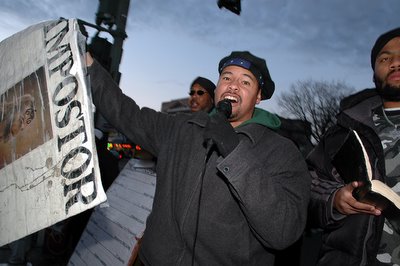 (CLICK FOR LARGER VIEW) This fellow spiritedly denounces a smiling woman who was politely distributing flyers to people assembled at the corner of 8th and H Streets NE. She was promoting a local community church. (Copyright © 2006. David Klavitter)
(CLICK FOR LARGER VIEW) This fellow spiritedly denounces a smiling woman who was politely distributing flyers to people assembled at the corner of 8th and H Streets NE. She was promoting a local community church. (Copyright © 2006. David Klavitter)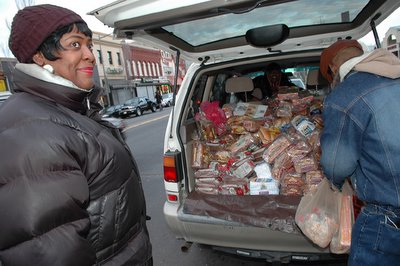 (CLICK FOR LARGER VIEW) A man helps himself to free bread on H Street. A woman named Carolyn (left) parked a van full of bread products behind the noisemakers’ stage on H Street. Carolyn was giving the baked goods away on behalf of a group called “Noah’s Ark.” The preachers apparently latched onto this as a good public relations opportunity and seemingly associated themselves with Carolyn’s generosity. (Copyright © 2006. David Klavitter)
(CLICK FOR LARGER VIEW) A man helps himself to free bread on H Street. A woman named Carolyn (left) parked a van full of bread products behind the noisemakers’ stage on H Street. Carolyn was giving the baked goods away on behalf of a group called “Noah’s Ark.” The preachers apparently latched onto this as a good public relations opportunity and seemingly associated themselves with Carolyn’s generosity. (Copyright © 2006. David Klavitter)
“We are also plagued with disruptive fundamentalists who use loud amplifiers on our street to preach messages about hate every weekend. We cannot simply go home to avoid listening to this since it can be heard even with our doors and windows closed.”
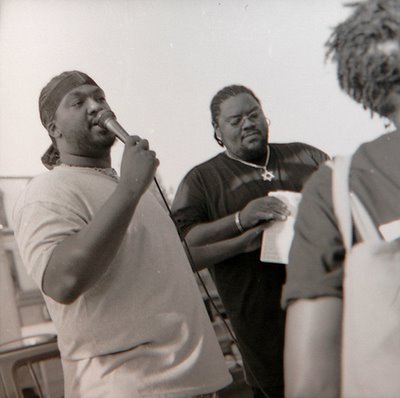 In September of 2004, the noisemakers use a microphone and amplifier at the southeast corner of 8th and H Streets NE. The amplified speech is projected south on 8th Street into the residential neighborhood. (Copyright © 2004. David Klavitter)
In September of 2004, the noisemakers use a microphone and amplifier at the southeast corner of 8th and H Streets NE. The amplified speech is projected south on 8th Street into the residential neighborhood. (Copyright © 2004. David Klavitter)
Have had my fill in a big way...it would seem that the Israelite's (or whatever they call themselves) right to assemble and amplify their message, already being yelled before amplification, trumps my right to live in peace w/out fear of noise invasion in the house we moved into and bought January 1991--to say nothing of the trash and litter lovingly dropped on the street and sidewalks here by those who frequent the bus stops and stores and assemblies at 8th & H streets, NE.
1--about two months ago, we buried my Uncle. We had our adult children from across the country, two cousins, one of their children, a 93-year old aunt, her 86-year old brother, the widow (also 86), and elderly relatives we met for the first time at the funeral for lunch at our house following the burial. The "group" was on the corner screaming and amplifying to its heart's content. We had the doors and windows closed, and turned on music to drown out the noise on the corner, but that does nothing for our guests and family when they enter or leave the house. What about our right to privacy? What about our right to assemble peaceably in our own house? What happened to a "man/woman's home is their castle?" Maybe we need to call our armies (knights) to protect us.....
2--Every weekend, regardless of what we, who live here and pay taxes to support our city government and services, have planned or are coping with (at least one of our neighbors is dealing w/a serious life-threatening condition), we are subjected to and bombarded by outsiders scream at us and anyone else who dares to come here to visit us and our home.
3--It is New Year's eve and the "group" has been at it all afternoon. I am sitting in my living room, a fire in the fireplace, low-key music on the CD player, tree lights glowing, writing thank-you notes--a nice image....leaving out the amplified yelling from the corner.
When is the District of Columbia going to do something for it's citizens/residents to make this a place where one's home is their haven anyway?
Happy New Year, ain't it great????